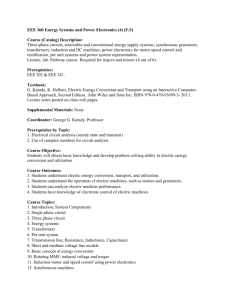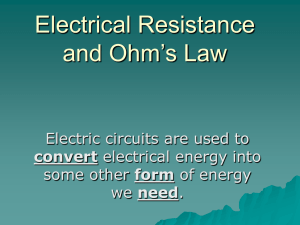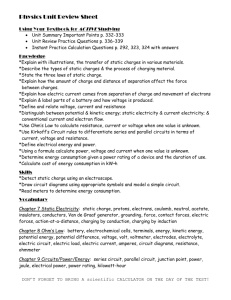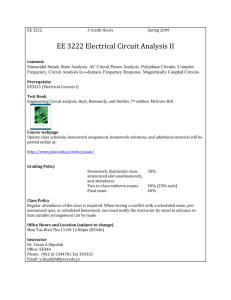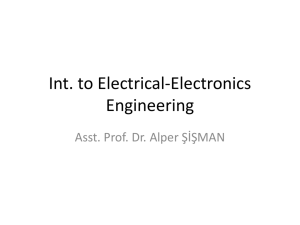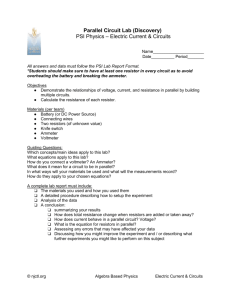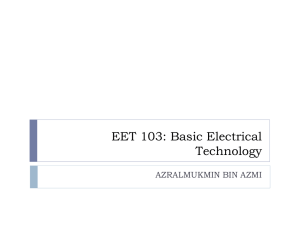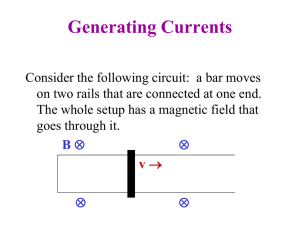Electricity and Magnetism Unit Outline
advertisement
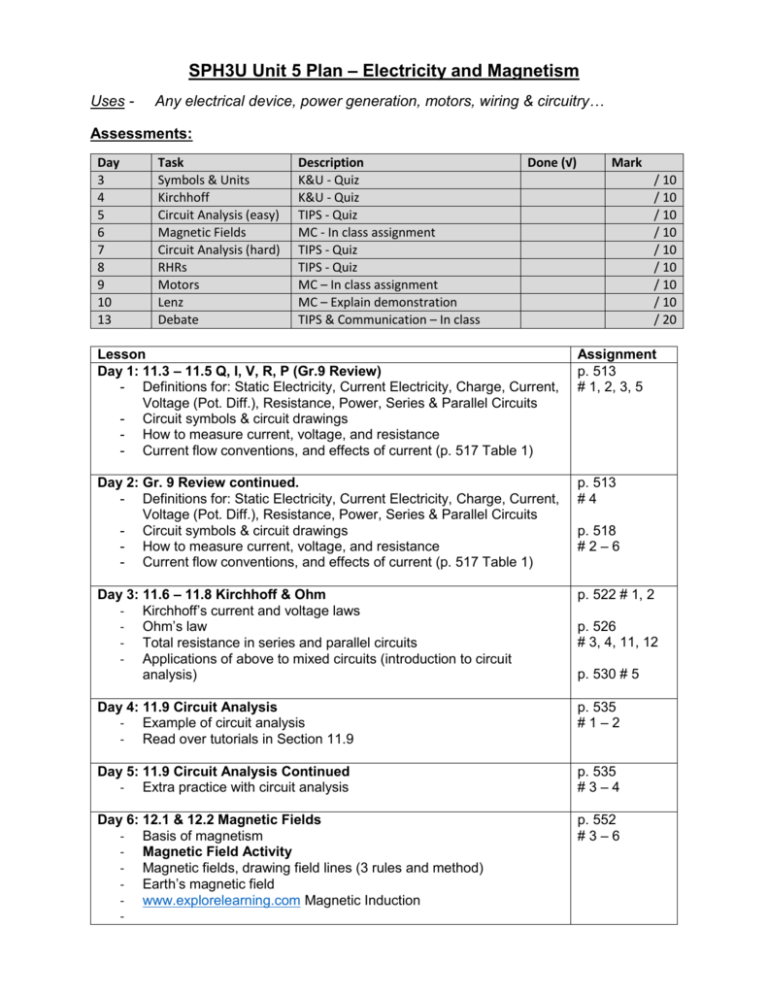
SPH3U Unit 5 Plan – Electricity and Magnetism Uses - Any electrical device, power generation, motors, wiring & circuitry… Assessments: Day 3 4 5 6 7 8 9 10 13 Task Symbols & Units Kirchhoff Circuit Analysis (easy) Magnetic Fields Circuit Analysis (hard) RHRs Motors Lenz Debate Description K&U - Quiz K&U - Quiz TIPS - Quiz MC - In class assignment TIPS - Quiz TIPS - Quiz MC – In class assignment MC – Explain demonstration TIPS & Communication – In class Done (√) Mark / 10 / 10 / 10 / 10 / 10 / 10 / 10 / 10 / 20 Lesson Day 1: 11.3 – 11.5 Q, I, V, R, P (Gr.9 Review) - Definitions for: Static Electricity, Current Electricity, Charge, Current, Voltage (Pot. Diff.), Resistance, Power, Series & Parallel Circuits - Circuit symbols & circuit drawings - How to measure current, voltage, and resistance - Current flow conventions, and effects of current (p. 517 Table 1) Assignment p. 513 # 1, 2, 3, 5 Day 2: Gr. 9 Review continued. - Definitions for: Static Electricity, Current Electricity, Charge, Current, Voltage (Pot. Diff.), Resistance, Power, Series & Parallel Circuits - Circuit symbols & circuit drawings - How to measure current, voltage, and resistance - Current flow conventions, and effects of current (p. 517 Table 1) p. 513 #4 Day 3: 11.6 – 11.8 Kirchhoff & Ohm - Kirchhoff’s current and voltage laws - Ohm’s law - Total resistance in series and parallel circuits - Applications of above to mixed circuits (introduction to circuit analysis) p. 522 # 1, 2 Day 4: 11.9 Circuit Analysis - Example of circuit analysis - Read over tutorials in Section 11.9 p. 535 #1–2 Day 5: 11.9 Circuit Analysis Continued - Extra practice with circuit analysis p. 535 #3–4 Day 6: 12.1 & 12.2 Magnetic Fields - Basis of magnetism - Magnetic Field Activity - Magnetic fields, drawing field lines (3 rules and method) - Earth’s magnetic field - www.explorelearning.com Magnetic Induction - p. 552 #3–6 p. 518 #2–6 p. 526 # 3, 4, 11, 12 p. 530 # 5 Day 7: 12.4 & 12.5 RHRs - Oersted’s Principle - RHR #1 (drawing conventions) - Applications of induction (Maglev, MRI, aurora borealis, motors…) - Ampѐre’s solenoid & RHR #2 - Factors affecting the strength of an induced magnetic field - Applications of solenoids (read p. 561) - Faraday’s motor principle & RHR #3 p. 556 # 1, 2, 5, 6 Day 8: 12.6 AC & DC Motors - Read Section 12.6 and make notes and diagrams on the structure and function of the DC motor with brushes - Make note of how the armature DC motor is different and its advantages p. 571 #1–3 Day 9: Motors - Motor Activity Catch-up/ Review Day 10: 13.1 & 13.2 Induction and Lenz’s Law - http://www.youtube.com/watch?v=VPxdl1zpcC8 - Law of Electromagnetic Induction - Factors affecting induction - Applications of induction - Lenz’s Law - Examples predicting the direction of the induced current p. 591 # 2, 3, 4 Day 11: 13.3 – 13.5 Generators and Transformers - Alternating current - Transformer structure and function (step-up and step-down) - Read p. 596 – 598 on household circuits and safety systems - Read Section 13.4 and make notes and diagrams on the structure and function of the AC generator p. 598 # 3, 5 Day 12: Research for Debate - Work on research presentation. Work on debate. Day 13: Debate - Come to class ready to present. Work on cumlinating. p. 562 #1–5 p. 566 # 1, 2 p. 594 #1–4 p. 604 # 4 p. 609 # 1, 2, 8 Unit 1 – 5 Formulas vav = ∆d ∆t aav = v2 + ⃑⃑⃑⃑ v1 ⃑ = (⃑⃑⃑⃑ ∆d ) ∙ ∆t ∆v ∆t v22 = v12 + 2a∆d 2 v2 = ⃑⃑⃑ ⃑⃑⃑⃑ v1 + a⃑∆t ⃑⃑⃑⃑ ∆d = ⃑⃑⃑ v1 ∆t + 1 a⃑∆t 2 2 ⃑⃑⃑⃑ ∆d = ⃑⃑⃑⃑ v2 ∆t − fnet = ma Fg = mg W = F ∙ cosθ ∙ ∆d % efficiency = P= W = ∆E m s2 [down] EK = 1 2 ff = μfn mv 2 EG = mgh work done towards desired outcome energy output × 100% = × 100% total work done energy input W ∆E = = F ∙ vavg ∆t ∆t Q = mc∆T = ml(v or c) α: g = 9.8 1 a⃑∆t 2 2 A ZX → A ZX β− : A −4 Z −2Y → 0 −1e capture: T= ∆t N 0 K = −273℃ E = mc 2 273 K = 0℃ + 42He (α) A Z + 1Y A ZX 0 −1e + + 0 −1e (β− ) β+ : A → Z −1 Y A ZX γ decay: f= → A Z − 1Y A ∗ ZX → 0 +1e + A ZX (β+ ) + 00γ N ∆t f= m + s m v = fλ v = 331.4 f1 L1 = f2 L2 beat frequency = |f2 − f1 | 1 T F v = √ μT 0.606 s∙℃ × T vsound + vdetector fobs = fo ( ) vsound + vsource Q = Ne V= E Q I= Q ∆t V = IR Series: VT = V1 + V2 + V3 +. .. e = 1.60 × 10−19 C E P = ∆t = IV = I 2 R = 1C = 6.24 × 1018 e V2 R IT = I1 = I2 = I3 =. .. Parallel:VT = V1 = V2 = V3 =. .. IT = I1 + I2 + I3 +. .. R T = R1 + R 2 + R 3 +. .. 1 RT 1 1 1 = R + R + R +. .. 1 2 3
